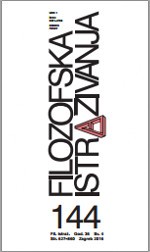Revolucija, rat i mir: smisao 20. stoljeća s one strane eurocentrizma
Revolution, War and Peace: The Meaning of the 20th Century Beyond Eurocentrism
Author(s): Alen TafraSubject(s): Political Philosophy, Social Philosophy, 19th Century Philosophy, Contemporary Philosophy, German Idealism, Philosophy of History
Published by: Hrvatsko Filozofsko Društvo
Keywords: philosophy of history; eurocentrism; world history; 20th century; communism; nazism; totalitarianism; historical revisionism; Domenico Losurdo;
Summary/Abstract: Since premodern narratives on translatio imperii, across the role of the Greco-Persian Wars and the Crusades in Hegel’s philosophy of history, the world-historical meaning of great conflicts represents one of the main issues of universal history. After premature quasi-Hegelian and postmodernist theses on the end of history and the end of the philosophy of history, this theme obtrudes the confrontations with the legacy of the twentieth century. The hegemonic Western recapitulation of the period in question depends on the concept of totalitarianism. In the case of historical revisionism, this implicates not only the accusation against the October Revolution because of the launching of the “international civil war”, but even the critique of the wider revolutionary cycle initiated in 1789. However, the revisionist manoeuvre works only under the condition of Eurocentric optical illusion which throws back colonialism as the key dimension of the modern progress. Moreover, the reasons for the failures of the contemporary left ought to be sought in the underestimation or neglect of the anti-imperialist struggles and their geopolitical conditions. This paper endeavours to respond to actual challenges by means of an overview of Domenico Losurdo’s interdisciplinary philosophy of history.
Journal: Filozofska istraživanja
- Issue Year: 36/2016
- Issue No: 04/144
- Page Range: 739-752
- Page Count: 14
- Language: Croatian

